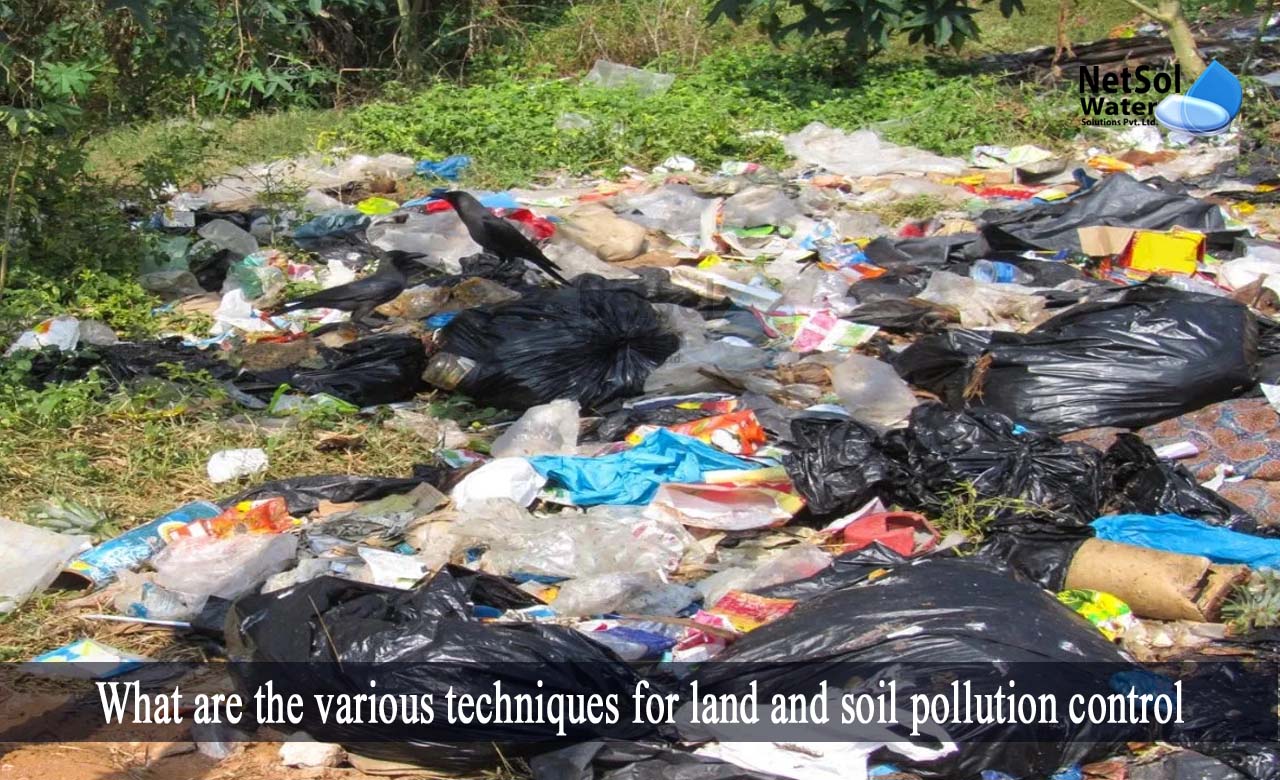Soil pollution
When abnormally high amounts of harmful compounds are present in the soil, it is referred to as soil pollution. Given the numerous health risks it contains, it is a severe environmental problem. For instance, exposure to soil with high benzene concentrations increases the chance of developing leukemia.
It is crucial to realize that all soils include substances that are poisonous or hazardous, to humans and other living things. However, because of their low quantity in unpolluted soil, these compounds do not endanger the local environment. The soil is deemed polluted when the concentration of one or more of these harmful compounds is high enough, to harm living things.
In this blog, we will discuss about some of the techniques for controlling land or soil pollution.
Primary contributors to soil pollution
· Agriculture (overuse or incorrect use of pesticides).
· A lot of industrial activity.
· Inadequate waste management or ineffective garbage disposal.
The degree of soil pollution directly affects the difficulties involved in remediating (de-contaminating) the soil. The more contaminated an area is, the more resources are needed for clean-up.
What harmful effects does the soil pollution have?
A wide range of unfavorable conditions, caused by soil contamination harm humans, animals, plants, and the environment, as a whole. Children are more vulnerable to disease, thus contaminated soil is more dangerous to them.
Impacts of soil pollution on Humans
All the three stages of solid, liquid, and gaseous components can act as soil pollutants. As a result, there are several ways that these toxins might enter the human body, either through direct skin contact or by being inhaled along with contaminated soil dust.
It should be emphasized that several soil contaminants, including industrial solvents and petroleum hydrocarbons, have been connected to a variety of human congenital diseases.
Effects of soil pollution on Animals and Plants
In such soils, plant growth ceases to flourish because nutrient availability is typically decreased, along with soil contamination. Soil that contains inorganic aluminium can make plants toxic.
Additionally, this kind of pollution frequently raises the soil's salinity, which makes it unsuitable for the development of plant life.Through a process called as bioaccumulation, plants grown in polluted soil may collect significant amounts of soil pollutants. All the accumulated toxins are passed when herbivores eat these plants.
Consequences of soil pollution for the Ecosystem
A clear link between soil pollution and air and water pollution exists, because volatile chemicals in soil can be blown into the sky by winds or seep into subsurface water reservoirs.
Additionally, it may cause acid rain (by releasing huge quantities of ammonia into the atmosphere).Several microorganisms that enhance soil texture and aid in the breakdown of organic materials are hostile to acidic soils.
Thus, the detrimental impacts of soil contamination also affect the texture and quality of the soil.This type of pollution has a significant impact on crop productivity as well.
What are the various techniques for land and soil pollution control?
· The usage ofless chemicals and pesticides in the agriculture
Finding alternatives will aid in minimizing the impact on the environment, because the use of pesticides and other chemicals in farming and agriculture, significantly contribute to land pollution.
By moving from bio-fertilizers to manure, farmers, for example, can employ natural ingredients. Supporting local, environmentally aware farmers at your neighborhood farmer's market or grocery shop, might encourage them to adopt more ecologically friendly agricultural methods.
· Reforestation
Reforestation entails planting new trees in a location. For example, this may be required in places that have recently had wildfires or where trees have been felled and processed.
By helping to bond the soil, this process shields it from land contamination, reduces soil erosion, and reduces floods.
· Treatments for solid waste
When solid waste is not correctly handled, the amount of toxins and dangerous compounds in the soil might grow. Land pollution can be decreased with the use of chemical treatment techniques, used in a controlled setting.
This method of treating solid waste also involves neutralization. Before being placed into landfills, solid waste undergoes this treatment to change its pH level.
· Reducing, Reusing, and Recycling
There are numerous things we can do personally to lessen our contribution to land contamination. Reusing or recycling products is one of the simplest methods to do this, and prevent the creation of waste from materials or objects that still have useful lives.
It has never been simpler to recycle, thanks to rising recycling awareness and an increase in recycling containers in many locations. Composting is another approach to lessen land pollution. Environmental waste is avoided by reducing and reusing waste goods.
How can we assist?
If you’re looking to make a difference on a community level, you are at the right place. Netsol Water has solution for your every concern, be it water pollution, air pollution, soil pollution, etc.
We have an environmental cleaning expert team and with their immense knowledge, these experts can help you at your every step towards a better future, and a cleaner environment. You can contact our environmental cleaning experts at +91 9650608473 or get in touch via email at enquiry@netsolwater.com.



